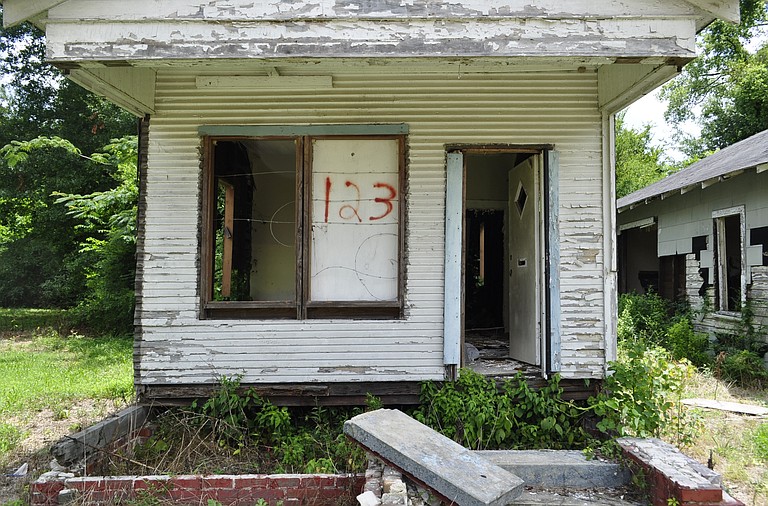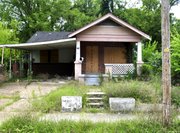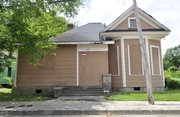Abandoned and dilapidated houses, such as this one on Farish Street, are common in parts of Jackson and neighbors are fed up. Trip Burns
Wednesday, July 24, 2013
Inez Jenkins had just about enough.
The lot at 2941 Morton Ave., right across the street from her house, was overgrown, and it was embarrassing when her friends from church came over after services on Sundays. Her grandson even, as she said, killed "a big ol' fat snake" on the lot.
A pair of the unlikeliest partners rode to her rescue: Republican Secretary of State Delbert Hosemann and District 5 Hinds County Supervisor Kenneth Stokes, a Democrat. Hosemann's office donated the lot, which was repossessed for non-payment of taxes, to Hinds County, which agreed to finance construction of a community walking trail.
The renovation of the previously useless lot is a story that's becoming more and more common, as abandoned lots and dilapidating housing remain one of the biggest problems in the city of Jackson.
At a July 18 meeting of the Jackson City Council, newly appointed police and fire chiefs, Lindsey Horton and Willie Owens, respectively, explained why abandoned homes are such a blight to the community.
"Besides being a visual detriment, people squat in the abandoned houses and use them for drugs and prostitution," Horton said. "In the winter, they start fires inside to stay warm, and when they leave, it starts fires and becomes a real public-safety issue."
"In the old days, we used to burn them," Owens chimed in. "But the Environmental Protection Agency put a stop to that, because of the chemicals that were released into the air when we did it."
For many of the properties, the process to clean them up is caught up in a nearly endless cycle of letters by mail, empty threats from the city and legal tangles that take months and even years to resolve.
When a complaint is made on a property, the city sends someone to assess whether the property is in violation of city codes. If it is, the city issues a warning to the property owner, who has 90 days to respond, but that can be done with a simple letter and one-time compliance. If, for example, the violation is due to an unkempt lawn, the owner can have the grass cut once. If he or she then fails to keep up the lawn again, another complaint must be filed, and the 90-day process starts over. In that way, the laws benefit the landowners and make it difficult for the city to wrest abandoned properties from owners who aren't caring for them.
"Many of these people who own the property are absentee landlords," said Kimberly Hilliard, executive director of Jackson State University's Office of Community Engagement. "They are not locally invested in the city. They own the land or house, and they are paid up on their taxes, but they don't live here and aren't keeping up the property."
Hilliard has researched the problem of blight and abandoned housing as part of her role in Vision 2022, a Greater Jackson Chamber of Commerce initiative aimed at improving the metro area. She explained that when the state repossesses property from the owner, it isn't necessarily a bad thing.
"It's sometimes a great thing when that happens," Hilliard said. "These absentee owners aren't keeping up the yards or keeping the house up to code at all, and it brings down the value of not only that home, but all the others around it. If the taxes aren't paid, and the state takes over the property, at least they keep it up--up to a certain dollar amount. They'll at least cut the grass and keep it looking presentable."
The secretary of state's website lists some 3,000 empty lots and abandoned houses in Hinds County alone. The properties range in price from free to more than $400,000, but the site lacks an easy search function.
Private citizens can purchase the property directly from the state, but the city of Jackson has also had some success in the past by asking the state to give the property to the city. The law prevents the secretary of state's office from donating the properties directly to non-profit organizations, but it doesn't prevent them from donating them to a municipality.
The Jackson Free Press featured one such project June 12 in a story about Voice of Calvary Baptist Church, which had obtained properties from the city for the purpose of refurbishing them, then assisting and subsidizing low-income families to get them through the buying process. Under that program, Jackson gave Voice of Calvary several dilapidated homes that the state had donated to the city.
Hilliard and her partners on Vision 2022's neighborhood beautification subcommittee have recently been in contact with the Center for Community Progress, a non-profit organization with offices in Flint, Mich., Washington, D.C., and New Orleans, which has helped communities around the country reclaim blighted areas and turn vacant spaces into vibrant areas.
It's an uphill battle, but other cities have done it with varying levels of success. Just last year, the White House honored Center for Community Progress fellow Steve Mantle for turning a state-owned, run-down Flint warehouse into a park along the Flint River.
But solutions for Jackson don't have to be that grand. As Hilliard pointed out, if the city, county and state all worked together, and neighbors were aware the lots were available at a reasonable price, the number of vacant properties could be cut down significantly.
"Right now, we have a system where the county, city and state all have their own processes for dealing with the abandoned properties," Hilliard said. "If they were all pulling in the same direction, or had one central plan for dealing with them, they could make some serious progress."




Comments
bthennington1 10 years, 9 months ago
I wish someone would take over the properties where these houses reside. It is disgusting and as the article states, "Besides being a visual detriment, people squat in the abandoned houses and use them for drugs and prostitution." Jackson must fix the problems at the residential level before the downtown can bounce back. The first step is removing the eyesores/ drug houses that are abundant throughout the downtown. Jackson government officials should give huge incentives or just give the property to developers at a nominal price to transform the space. This should be one of the first areas that Mayor Lumumba tries to "leave his market" on Jackson.
ellynpence 10 years, 8 months ago
Back in the 1950's my mother fought against landlords of uninhabitable rental houses in Jackson. The only difference between now and then is that there were people living in those shacks and paying rent for them in the '50s. They usually had no inside plumbing or electricity. Very poor people, both white and black people lived in them. My mother got an appointment with one of the worst offenders to talk with him about his rental properties, and he quoted the Bible to her, "The poor we have with us alway." My mother was a Bible scholar of some repute. Her answer to him was, "The Devil can quote scripture for a purpose." She, as president of the Jackson chapter of the National Christian Womens' Association, a Protestant group, and two other activists, Rabbi Nusbaum of the Jewish Temple, and Monsigneur Brunini, of the Catholic Church, lobbied Mayor Thompson to try to get something done. (They were sometimes referred to as "The Unholy Trio.")
Sign in to comment
Or login with:
OpenID